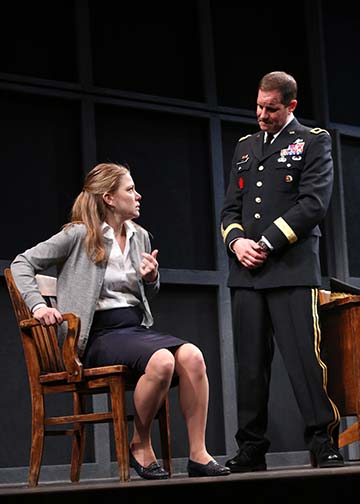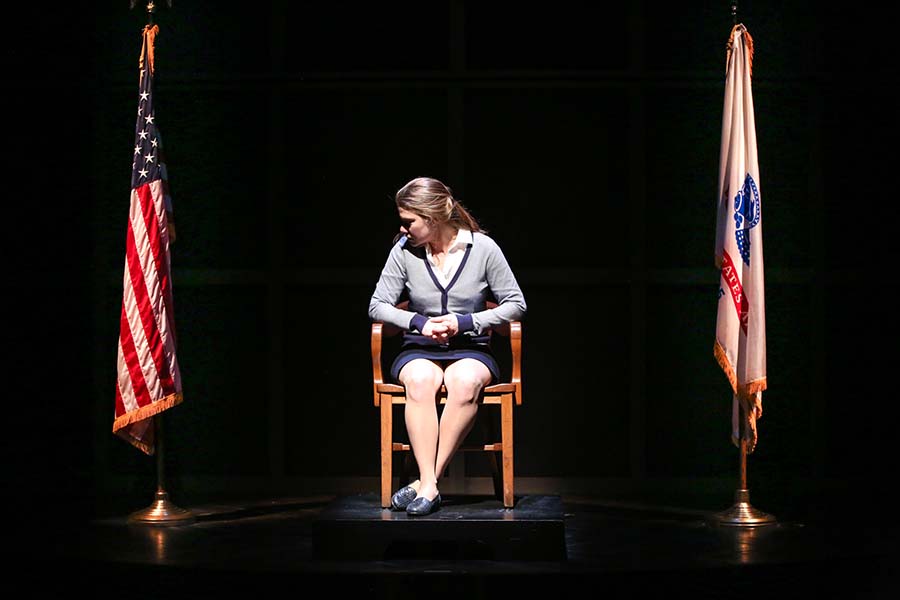When playwright Jamie Pachino came across a 2007 Salon article “The Private War of Women Soldiers,” about sexual assault in the military, she felt the need to investigate.
“It was so relevant and immediate; it just felt like it needed to be dramatized,” Pachino recalls. “I just couldn’t look away.”
Her resulting play, Other than Honorable, is having its world premiere, directed by Kimberly Senior, at Geva Theatre Center in Rochester, N.Y., April 25-May 21.
Despite the several years Pachino spent researching—interviewing military personnel and civilians on the legal and organizational sides—and workshopping (initial readings occured in 2013), the play hasn’t lost its urgency. In March, news reports surfaced of Marines using social media to solicit and share nude photos of female service members and veterans. Additionally, recent numbers from an annual Department of Defense report show that cases of sexual misconduct at all three military academies are increasing.
“Sometimes when you write something that’s topical, you think, ‘Oh, I’ve got 10 minutes to get this play out into the world or else it won’t matter,’” says Pachino, who is also a writer and supervising producer on the NBC series “Chicago P.D.” “And what keeps happening is it keeps getting more relevant.”
Other Than Honorable follows Grace Rattigan, a private attorney who served in the military and left under vague circumstances. When she reluctantly takes on a military sexual assault case, she is confronted with her past, while her husband, a captain in the Army and her main ally, is stationed abroad. Throughout the production, Capt. Billy Rattingan appears only abstractly through video calls.
While Other than Honorable can easily be called a military play, both Pachino and director Senior say that’s not how they immediately describe it.
“Obviously the audience will feel this connection to the military,” says Senior. “But I think what’s so wonderful about the play is that it is a very specific example that feels universal—about voices becoming invisible and what happens when you scream and no one hears you.”

Pachino says she often describes the play as being about “a woman who has shut down and lost her voice, and finds it again through telling her story and telling the stories of others.” The cast features six onstage actors and four offstage actors as the voices of soldiers giving testimony. These testimonies are shown on screens built into the set.
“As we come into the play, the video is staticky and you just hear words or fragments of their stories, and their pictures go in and out,” Pachino says. “Then, over the course of the play, those voices start to emerge, the video becomes clearer, their voices become clearer, their stories become clearer.”
Jessiee Datino, who plays Grace, says she was unfamiliar with cases of sexual assault in the military before taking on the role. While she expected that her research would lead to articles in national newspapers, she found online communities instead.
“What I found were pages and support groups for people who had been assaulted in the military,” she explains. Datino was also upset to learn that sometimes sexual assault occurs on American soil, not only in war zones, and Other Than Honorable deals with this element as well.
When talking about the play, members of the creative team often use the image of a carnival ride, as the action seems to spin out of control around Grace. This idea was also central to Jack Magaw’s set design for the production.
“The main issue was that the play goes from scene to scene very quickly, and it needed to feel like the world was sort of happening to Grace, at least in the first act,” Magaw explains.
A turntable that can move in any direction is at the center of the set, with a secondary donut-shaped turntable encircling it. Sliding panels allow furniture and people to move in and out, and a fragmented wall serves as a backdrop for video projections. Overall the set has an “institutional” look to it, and Magaw was inspired by the gunmetal gray of an M16 assault rifle and the pixelated appearance of the modern camouflage pattern.
While he studied theatre, Magaw attended college on a Reserve Officers’ Training Corps (ROTC) scholarship and spent three years on active duty in the Army. Magaw and Senior also worked together on a production of A Few Good Men at Peninsula Players Theatre in Fish Creek, Wisc., in 2011, and that production as well as Magaw’s personal experience helped inform the design.
Senior wants audience members to leave feeling charged and thinks the play’s message will resonate with the community, especially since Sen. Kirsten Gillibrand of New York has championed a military sexual assault bill.
“What I hope with any piece of art is that you take another look, you have a deeper understanding, you question what you thought,” says Senior. “I would hope that it would have a lingering effect on the understanding of the issue.”


